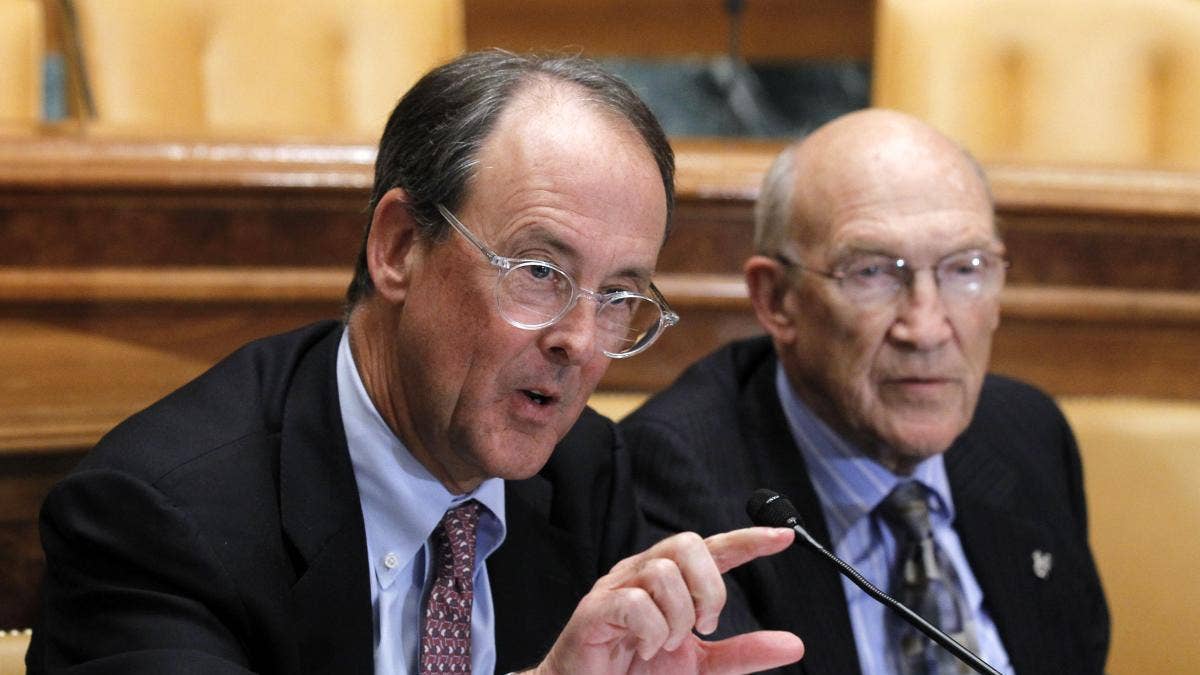
AP Photo
The top Republican and Democrat on President Obama's bipartisan deficit reduction commission introduced an ambitious draft proposal Wednesday to slash the nation's deficit by by $4 trillion over ten years, but both chairmen conceded that the focus is more on starting a national debate rather than actually accomplishing legislative action this year.
The draft, laid out in detail to commission members during two closed-door, hours-long sessions, spares virtually no "sacred cow" programs, proposing dramatic changes to Social Security, once called the "third rail" of politics, pushes for limits to Medicare, axes the popular mortgage interest deduction in favor of lower income tax rates for all, freezes Defense Department salaries and bonuses for three years and noncombat pay at 2011 levels for the same period, and the list goes on.
Sen. Kent Conrad, D-ND, a commission member, did not sound confident that 14 of the 18 members could agree on any proposal in order to move it to a vote in Congress. "We've had trouble getting 14 people to agree on what time of the day to meet," the Budget Committee Chairman said.
The often-comedic co-chairman Alan Simpson sheepishly exited the meeting, telling reporters, "We're entering the witness protection program," referring to his fellow co-chairman and proposal author Erskine Bowles, former chief of staff to President Bill Clinton.
Commissioners mostly commended the chairmen for attacking the problem and offering real, detailed solutions, but to a letter, not one member embraced the proposal, though Simpson and Bowles said they did not expect that. Still another member, Rep. Jan Schakowsky, D-Ill., called the Social Security changes "a nonstarter."
Schakowsky questioned the equity in the cuts, noted the "growing gap between rich and poor in this country," and said, "This is not at all something I could support."
Outside the bipartisan group, members slung arrows at the draft proposal, as well. Sen. Bernie Sanders, I-Vt., decried the plan as "extremely disappointing and something that should be vigorously opposed by the American people. The huge increase in the national debt in recent years was caused by two unpaid wars, tax breaks for the wealthy, a Medicare prescription drug bill written by the pharmaceutical industry, and the Wall Street bailout."
But some members cautioned against snap judgments. Sen. Tom Coburn, R-Okla., a member of the panel, said, "The greatest national security threat facing America today is our national debt and a Congress that has avoided tough choices for decades. The discussion draft describes some of the tough choices facing Congress and the nation," and warned, "I would encourage taxpayers to view with great suspicion the beltway, interest group culture that often prefers demagoguery over honest debate. In the real world, no family facing tough economic times has the luxury of treating portions of their budget as sacrosanct. Neither should Congress."
Simpson encouraged people to read the proposal and said there is more than enough time for Congressional action, saying he and Bowles "laid it all out on the table. Let the American people start to chew on it..As I say, we didn't leave anybody out of the crosshairs."
But Sanders was having no part of that, particularly the Simpson-Bowles proposal for Social Security that gradually increases the retirement age for benefits, possibly to 69 by 2075. Sanders blasted, "It is reprehensible to ask working people, including many who do physically-demanding labor, to work until they are 69 years of age. It also is totally impractical. As they compete for jobs with 25-year-olds, many older workers will go unemployed and have virtually no income. Frankly, there will not be too much demand within the construction industry for 69-year-old bricklayers."Commission Executive Vice President Bruce Reed told reporters that the panel intends to reconvene next week to get down into the details of the draft document and offer alternative proposals. And though he said members are still aiming to have a plan released on December 1, Reed did acknowledge that if members do not agree, the co-chairmen will certainly promote their own product separately to the American people.




